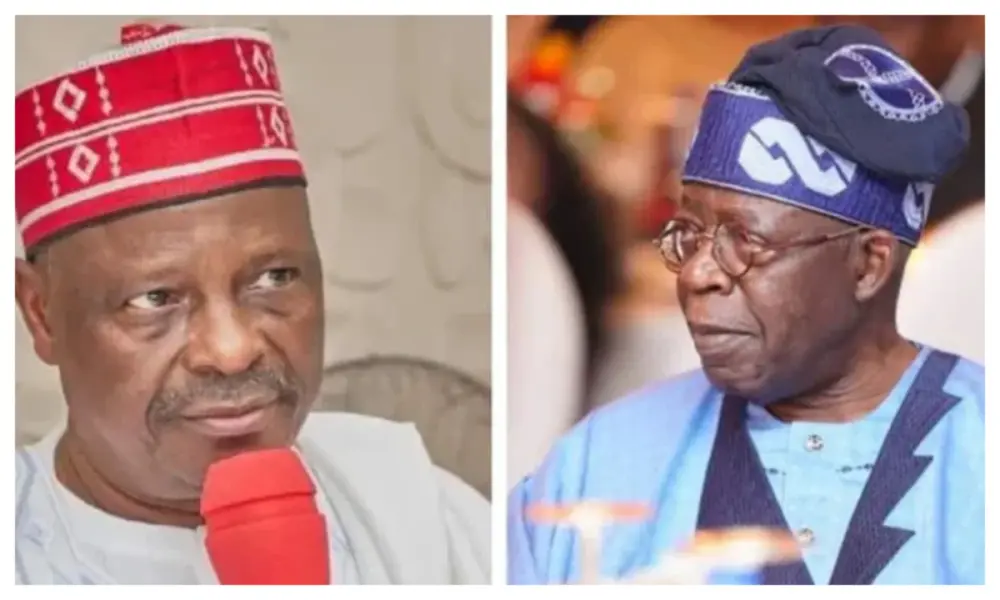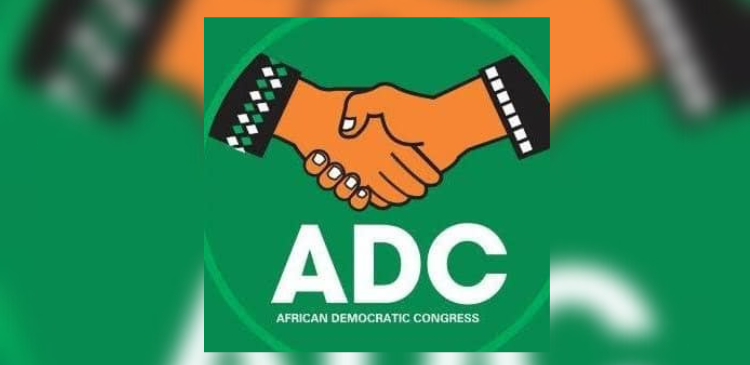Politics
I’m Prepared For Dirt In Politics – Tinubu

The presidential candidate of the ruling All Progressives Congress, Bola Tinubu, has said he is prepared for the dirt associated with politics.
He spoke at Chatham House in London, on Monday, where he addressed controversies surrounding his age, school and time in the private sector.
Fielding questions from the audience, the former governor of Lagos State revealed that efforts by those who questioned his school records ended in disappointment.
He said, “At the time of birth, I was dated March 29, 1952, in the family record. Then, I don’t think I had decided to be President of the Federal Republic of Nigeria, not even that I would go into politics.
“I’ve had very good exposure in life. My record is consistent in the university they questioned. They’ve now confessed that they wasted their money and their time. The record is there, and the transcript is there showing March 1952.
“I’m not claiming another father, I’m Tinubu and Tinubu proper. If they want DNA, they could as well request one.
“One of them has been accused of not being a Nigerian citizen, I didn’t touch that area.
“Equally, it remains the same. Chicago State University where I graduated has attested to that. Now, I can announce that I have received my original replacement degree certificate from them.
“Deloitte trained me as an accountant. Mobile Oil has attested to my outstanding record. I got to the pinnacle of my career in the private sector. Who among them can brag about that?
“Yes, if you want to wrestle with the pig, you’ve got to live with the dirt. That’s what I’m doing. I got into politics knowing fully well that it is muddy water. Smog will come, and you will have to live with the dirt and make sure you are upright to finish the job.”
In his opening speech, Tinubu expressed his stance against electoral violence and intimidation while urging others in the presidential race to allow Nigerians to decide the future of the country.
He said, “I stand firmly against all forms of electoral violence and intimidation.
“Haven spent most of my career in political opposition, I have long fought against electoral malpractice and any attempt to extinguish the legitimate choice of voters. I will continue to do so, I promise.
“I urge all my fellow contestants in this election to do the same. Let the sovereign will of the people decide the path of our nation. And let this election be determined by voters making their choice freely rather than the domineering intimidation of the troublesome few.”
He further told the audience, “I am confident that in a few short months, people will go to the polls and give me their mandates.
READ ALSO;2023: Finally, Tinubu Opens Up On Age, Chicago University Certificate, Work History
“I’m ready to lead and govern the country. I will return here to interact with you when the elections are over. I will come not with a long list of priorities for the future but with a plan for collaboration in the best interest of the country I love and dedicate myself to for a lifetime.”
Asked if his administration will ensure that Nigerians in the diaspora voted in subsequent elections, Tinubu stated that the current system of voting was yet to prove to be reliable enough to accommodate other systems.
He said, “I think it was El-rufai that mentioned last night that diasporans are entitled to voting. If you make contributions to the economy with remittances that you have been making, your right to vote should not be abrogated but promoted.
“However, we are still building confidence in our democratic and voting system. INEC is still yet to assure us during this election that electronic transmission – the technology being used for accreditation and the total vote count – is reliable, dependable and assuring in our democratic process before we introduce the complicated process of the mail-in ballot and others.”
Politics
PDP Crisis: INEC Rejects Turaki-led NWC

The Independent National Electoral Commission, INEC, has said it will not recognise the Kabiru Turaki-led National Working Committee, NWC, of the Peoples Democratic Party, citing existing court judgments and unresolved legal processes.
This was as contained in a letter dated December 22, 2025, signed by INEC Secretary, Dr Rose Oriaran-Anthony.
The Commission stated that it could not act on demands to acknowledge or upload on its website the list of national officers said to have been elected at the National Convention held on November 15 and 16, 2025, in Ibadan.
READ ALSO:Osun, Imo, Kano Lead As INEC Reports 2.3m New Voter Registrations
According to INEC, its position was guided by subsisting court decisions and pending litigation relating to the leadership crisis within the PDP.
The electoral body further noted that it would be improper to recognise any factional officers while the matter remains before the courts.
Politics
Govt That Fails To Protect Its Citizens Has No Business Remaining In Office – Kwankwaso

Senator Rabiu Musa Kwankwaso, leader of the Kwankwasiyya Movement and 2023 presidential candidate of the New Nigeria Peoples Party (NNPP), has accused the Federal Government under President Bola Ahmed Tinubu of lacking the political will to tackle Nigeria’s worsening insecurity.
Kwankwaso spoke on Tuesday in Kano while unveiling 2,000 operatives of the Kano State Neighbourhood Security Network.
He urged President Tinubu to “rise to the occasion and truly act as the Commander-in-Chief” in addressing banditry and other security challenges.
READ ALSO:Tinubu Embarks On Three-state Visit
According to him, Nigeria’s military “remains one of the most gallant in the world,” having served in international peacekeeping missions in Darfur, Liberia, and other conflict zones.
However, he said the armed forces are not being adequately supported to perform optimally.
“Today, many innocent Nigerians are being killed, while the perpetrators walk freely as if nothing happened. The government must apologise to Nigerians for its laxity in the fight against insecurity,” he said.
Kwankwaso, who once served as Minister of Defence, added: “When I was Defence Minister, I knew the capability of the Nigerian military. They are courageous and professional but need clear direction, support, and political will to do the needful.”
READ ALSO:Soyinka Decries Seyi Tinubu’s ‘Excessive’ Security Escort
He stressed that Nigeria’s armed forces had historically ranked among the best globally and urged the government to equip them properly to change the current security situation.
Kwankwaso also said that if elected president in 2027, he would recruit over one million additional military personnel to strengthen national security.
“Any government that fails to protect the lives and property of its citizens has failed woefully and has no business remaining in office,” he declared.
He further called on the Federal Government to integrate community-based security initiatives, like the Kano Neighbourhood Security Network, into the national security system to boost morale and improve intelligence-driven operations against criminals.
Politics
ADC Announces Temporary Closure Of Secretariat

The African Democratic Congress, ADC , says it has temporarily closed its National Secretariat as part of the end-of-year break.
A statement by its National Publicity Secretary, Bolaji Abdullahi, said full operations are scheduled to resume in the New Year.
According to the statement, the secretariat will close on December 23, 2025, and reopen on January 5, 2026.
READ ALSO:Irresponsible Of You To Blame Trump Over Rising Insecurity – ADC Blasts Tinubu’s Govt
The party, however, said essential skeletal services will remain available throughout the period, while all other official activities at the National Secretariat will be suspended to allow staff and party officials observe the Christmas and New Year holidays.
“This is to inform the public that the African Democratic Congress National Secretariat will close for the year on 23rd December 2025 and will resume full operations on 5th January 2026.
“During this period, only skeletal services will be available, while all other official activities at the Secretariat will be temporarily suspended,” the statement said.
READ ALSO:Hoodlums Set Ablaze ADC Secretariat In Ekiti, Disrupt Party Excos’ Inauguration
The party thanked its members, partners and supporters for their continued loyalty and cooperation throughout the year, noting that their support remains critical to the growth and stability of the party.
The ADC also said it is committed to its ideals and to democratic engagement as it prepares for activities in the coming year.

 News2 days ago
News2 days agoPHOTOS: New Era In Furupagha-Ebijaw As Okpururu 1 Receives Staff Of Office

 Metro4 days ago
Metro4 days agoJUST IN: Former Edo Information Commissioner Is Dead

 News1 day ago
News1 day agoUBTH CMD Marks 120 Days In Office, Expresses Commitment To Providing Conducive Working Environment

 News2 days ago
News2 days agoFG Declares Public Holidays For Christmas, New Year Celebrations

 News5 days ago
News5 days agoCoordinator, Edo First Lady Office, Majority Leader, Rights Lawyer, Others Bag 2025 Leadership Award

 News5 days ago
News5 days ago[OPINION] Tinubu: Ade Ori Okin Befits KWAM 1, Not Awujale Crown

 Metro4 days ago
Metro4 days agoShe Grabs, Pulls My Manhood Anytime We Fight — Husband

 News2 days ago
News2 days agoOPINION: Gumi And His Terrorists

 Metro4 days ago
Metro4 days agoWhy I Charged My Husband Money For Sex —Woman

 News4 days ago
News4 days agoMy Wife Dented My Image, Took Our Marital Crises To Radio Stations — Husband
































